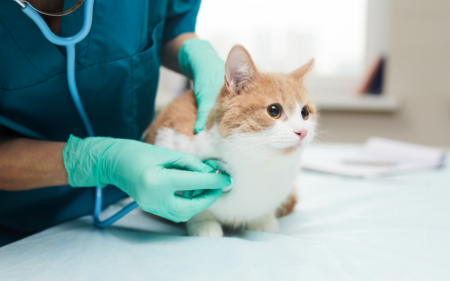
Dental care for your pet
Dental disease is very common in cats and dogs. Surveys show that after the age of three years, about seven out of ten pets have some kind of tooth disorders, and if left unattended these may cause irreversible damage to your pet’s teeth, gums and jaw bones. The good news is that dental disease can easily be prevented by stopping the build up of plaque.

How do I know if my pet has tooth disease?
Plaque is a yellowish white deposit made up of bacteria and debris that forms around the surface of the teeth. In time it hardens to become a yellowish brown tartar (sometimes called calculus) at the base of the tooth, which will gradually spread until it may cover the whole of its surface. As well as the visible tartar, there may be other indications of disease: foul breath is very common and the pain resulting from advanced dental disease may cause difficulties in eating. If your pet dribbles excessively, and sometimes this is flecked with blood, or if he shows signs of pain and discomfort such as head shaking and pawing at his mouth, your pet would benefit from a dental check from the vet.
How does dental disease affect my pet’s health?
The tartar hidden below the gum line is the most common cause of problems. It contains bacteria that attack the surrounding gum tissue, causing painful inflammation (‘gingivitis’) and infection that can track down to the tooth roots. Pus may then build up in the roots and form a painful abscess. The inflammation wears away tissue from the gum, bones and teeth and, as the disease becomes more advanced, the teeth will loosen and fall out. Bacteria, and the poisons they produce, can also get into the blood stream and cause damage throughout the body in organs such as the kidneys, heart and liver.
How can dental disease be treated?
If your pet has advanced disease and is in obvious pain, we may need to take x-rays of his head, under general anaesthesia, to see whether there are any deep abscesses. We may prescribe antibiotics before doing dental work if there are signs of infection. Any loose teeth will have to be removed because the disease here will be too advanced to be treated successfully. Your pet will be given a general anaesthetic so that we can remove the tartar, usually with an ultrasonic scaling machine, then the teeth will be polished to leave a smooth surface, thus slowing down the build up of plaque in the future. To keep your pet’s teeth in good condition it is likely that they will need regular scaling and polishing in the future, in some cases at intervals of between six and twelve months.
How can dental disease be prevented?
There are a number of products available to help you with prevention and control. Some are listed below:
- Tooth brushing
- Dental chews
- Dental gels
- Special foods
Will a change in diet help control dental disease?
In the wild your pet’s teeth would be much cleaner because its diet would contain harder materials than are found in commercially tinned or packaged foods. Dogs and cats naturally eat the bones, fur, etc of their prey, which wear away the deposits of tartar. Replacing soft foods with dry or fibrous materials will slow the build up of plaque, as the extra chewing involved helps control infection through the production of saliva (which has natural antibiotic properties). There are special diets and treats available to help maintain clean teeth, please ask your vet for further advice. We do not advise that dogs are given bones as these can cause other problems such as vomiting, diarrhoea or intestinal blockage
What else can I do to keep my pet’s teeth clean?
Ideally your pet should get used to having its teeth cleaned from an early age. Wrapping a piece of soft gauze around your finger and gently rubbing the teeth should get the animal used to the idea. You can then move on to using a toothbrush specially designed for pets or a small ordinary toothbrush with soft bristles.We can supply you with suitably flavoured toothpaste that your pet will enjoy, and there are also some mouth washes and antibacterial gels that can help reduce plaque deposits and prevent infection. Do not attempt to use human toothpaste which will froth up in the mouth, your pet will not like the taste and it could do it serious harm as it is not designed to be swallowed.
What if my pet doesn’t like having its teeth brushed?
At first your pet may resist but with gentleness, patience and persistence most pets can be trained to accept having their teeth cleaned. A regular brushing every day or at least three times a week will significantly reduce the risk of your pet suffering serious problems.
Our staff are always here for you if you have any questions or concerns about your pet(s), so please do not hesitate to drop into our surgery, give us a call on 01457 852367 or e-mail enquiries@victoriavets.co.uk, and we’ll always do our best to help.


